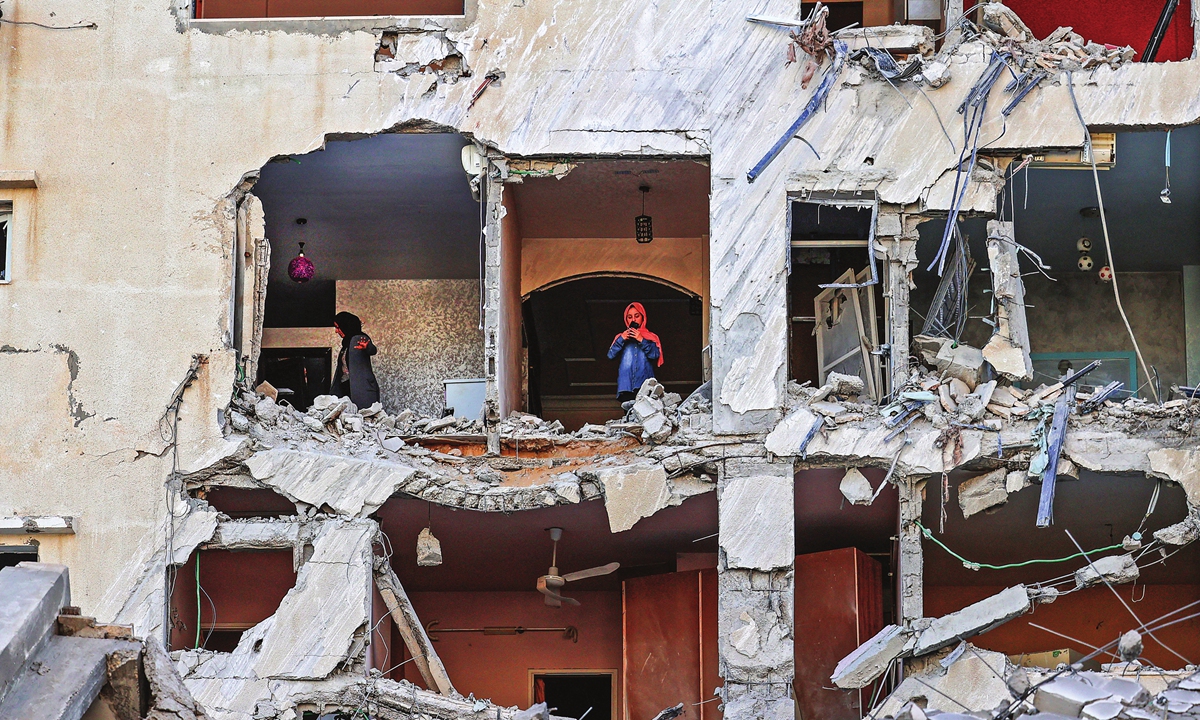-

- Li Weijian
- Senior Research Fellow
- Center for west Asian & African Studies
- Institute for Foreign Policy Studies
- Prof. Li Weijian interviewed by Global Times on the situation in Afghanistan
- Li Weijian:US leaves Iraq in tatters to target China, but still keeps the region on radar
- Despite hurdles, biggest wish of Afghans remains peace
- A US-Iran military conflict unlikely
- Erdogan's China visit: main concern is Turkey's economy
- China Plays Great Role in Fighting ...
- Why China's role is not very visibl...
- Is the Iran Nuclear Issue Resolved?
- Iran’s Economy after the Sanctions ...
- Ambassador's assassination:"lone wo...
- The Middle East Under Trump
- China, EU can cooperate in Middle E...
- The Jihadi Pivot to Asia
- The U.S. Should Take the Lead to En...
- What Will Trump’s New Iran Strategy...

Palestinian women check the damage inside an apartment in a heavily damaged building in Gaza City early on Wednesday, following continued Israeli airstrikes on the Palestinian territory overnight. Israeli air raids in the Gaza Strip have hit the homes of high-ranking members of the Hamas militant group, the military said Wednesday, with the territory's police headquarters also targeted. Photo: AFP
Tensions between Israel and Palestine have been flaring up over past couple of days. This is not an accidental event. While the Palestine-Israel conflict has not been tackled, clashes between the two sides take place from time to time.
Furthermore, the Trump administration's policies had reverberated across the region, impacting Palestine. For example, former US president Donald Trump announced in 2017 that the US recognized Jerusalem as Israel's capital. This overturned decades-old official US policy. And then in 2018, Trump decided to move the US embassy to Israel from Tel Aviv to Jerusalem. Palestine has been very dissatisfied with these moves.
Israeli Prime Minister Benjamin Netanyahu failed to form a new governing coalition by the May 4 deadline. It puts into question whether he will continue to hold the office. The incumbent Israeli government may hope to exploit the tensions to serve domestic politics. By provoking nationalist sentiments, it can gain more support. This may be one of the reasons why Israel has forced the expulsion of Palestinian families from their homes in East Jerusalem's Sheikh Jarrah neighborhood in recent days.
According to previous experiences, such clashes between Israel and Palestine will last for some time. In the past when the international community or some countries mediated, tensions would come to an end. Now as the international community is paying a lot of attention to the escalation, the current clash is not anticipated to last for a long time. Nor even get out of control.
But even if tensions ease, the Israeli-Palestinian conflict will not be resolved, and clashes may still occur. It also reminds the international community, especially the US, that the Israeli-Palestinian conflict should be properly dealt with. Simply taking sides with Israel cannot settle problems.
Tom Fowdy, a British analyst, said in an article that was published on Russia Today Monday that "America is to blame for the bloody violence in Jerusalem." This round of escalation of the Israel-Palestine conflict is closely connected to the US. After Trump assumed office, quite some of US practices were carried out in favor of Israel, at the expense of Palestinian interests. Palestine has been dissatisfied for a long time.
In May 2020, US President Joe Biden said the "cause of Israeli-Palestinian peace should be resuming our dialogue with the Palestinians and pressing Israel not to take actions that make a two-state solution impossible." Some Palestinians thus have expectations for Biden, who actually almost said nothing about the issue after taking office.
Regarding the deepening conflict in the region, Biden said, "Israel has a right to defend itself," during a White House press conference Wednesday the US time. This remark may make Palestinians very uncomfortable.
Compared with other countries, the US can exert more influence on Israel. It could play a more effective role to stop the conflict from worsening. If the situation deteriorates, the US will say something due to the international pressure. But as the Biden administration attaches more significance to Iran in terms of the Middle East issues, it may not focus too much on this round of tensions in early stage. But if the tensions keep spiraling, Washington might put pressure on Israel. It is anticipated that the latter will know when to stop. Making a big fuss will not bring about better results for Israel.
The UN and neighboring Arab countries will also play a certain role in the mediation process. Some observers believe the Israel-Palestine problem has been marginalized. Palestine feels disappointed in some Arab countries because they used to stand with it unconditionally but now they have established diplomatic relations with Israel. Thus, how these countries will take a stand and adjust their policies over the clash is vital as well.
Moreover, major powers like China and Russia will make efforts to ease tensions between Palestine and Israel through multilateral mechanisms, such as the UN. Beijing and Moscow are important forces to advance world peace. Chinese and Russian foreign ministries have already called on both sides of the conflict to exercise restraint.
Peace and stability cannot be achieved without a solution to the Israel-Palestine conflict. Previously, it was the US that steered the wheel of Middle East issues. However, a solution to the Israel-Palestine conflict should be settled by international efforts under a more representative international mechanism within the framework of the UN. It should not be determined by the US alone. China and Russia need to continue to call on the international community to pay wider attention to the problem on multilateral occasions.
Source of documents:Global Times, May 13
